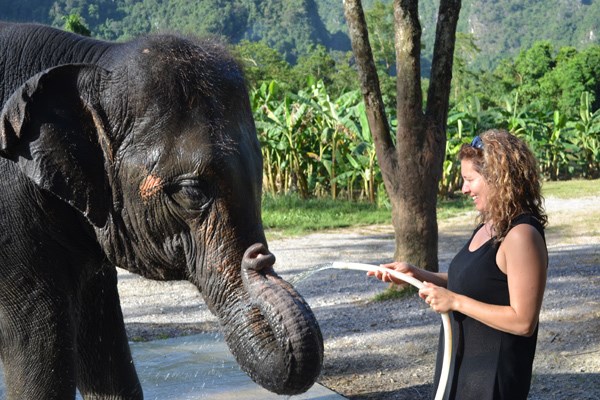KHAO SOK, Thailand-With a grunt of pleasure, the elephants amble slowly into a pool of deep, muddy water, kneel down and wallow in what can only be described as elephant ecstacy. The temperature in southern Thailand is hovering at 35 degrees Celsius and for a few minutes we can't help but feel a little jealous that they get to swim while we have to watch. Then we notice elephant excrement the size of whole cantaloupes floating nearby and any smidgeon of jealousy evaporates immediately. Those elephants are going to need a good wash when they emerge from their cesspool-and we're the ones who will be washing them.
I'm at Elephant Hills, a luxury tented resort on the doorstep of Khao Sok National Park in Thailand and a place that's as close as you can get to a retirement home for elephants. Most of the resort's 14 elephants worked previously in the logging industry. But when the Thai government outlawed logging in 1989 the elephants needed a new way to earn their costly upkeep. Many of them now serve as the docile carriers in elephant back safaris, a wildly popular tourist activity. For the lucky few at Elephant Hills, though, life is no more complicated than a daily stroll for exercise, a massive bucket of fruit salad and a good wash by visitors who want a more intimate elephant encounter than a safari.
Earlier, with hatchet in hand, we prepared their afternoon snack, slicing pineapple, watermelon, bunches of bananas and bamboo into a trough. With their mahouts carefully balanced on their backs, the elephants approached us for food, their trunks curling around the fruit offerings and moving large quantities into their mouths. Given that their daily food consumption totals 250 kilograms, our fruit was a mere snack and a coveted delicacy. When the bucket was empty it was time for a swim, and soon after, a much needed bath.
The elephants are nothing if not obedient. They follow their mahouts' commands with intelligence, waiting patiently as they are hosed down and then scrubbed with loofah-like coconut husks. It's an outdoor elephant spa and our job is to deliver the full-body exfoliating scrub, a wash that promises to leave their leathery skin cleaner.
Get up close to an elephant, with loofah in hand, and you can truly appreciate the enormity of these gentle creatures. The goliaths of the animal world, they can weigh up to 5,000 kg by the time they reach adulthood. "They have a special bond with their mahouts," says Mark Holland, camp coordinator at Elephant Hills. "And they're incredibly smart-they can understand up to 30 spoken commands."
Mahout Magic
Watching the mahouts engage with their elephants is an eye opening experience. They sit across the animal's neck, their feet or knees pressing against the nerve centers behind the elephant's ears. Using an elephant hook, the mahouts are able to give their elephants additional instructions, concentrating their attention in a way that cannot always be achieved through voice or touch.
In a time when modernization has reduced the traditional role of the elephant in Thai culture, the mahout is more valuable than ever, for without them, domesticated elephants cannot be properly cared for. Sadly, though, the mahout culture is as threatened by modernity as the elephant itself. Many mahouts have deserted their hooks in favor of the "glamour" of driving an air conditioned truck, resulting in a mahout brain drain in the forests of Thailand.
Back at the resort we take a rafting trip down river, spotting a yellow diamondback python hanging from a tree along the way. "Don't worry, their bite is not poisonous," our guide Por says encouragingly, as we paddle quickly away. The tangled mass of jungle that is Khao Sok National Park is teeming with wildlife, including gibbons that swing from tree to tree, Malaysian sun bears, monitor lizards, macaques, a goat-antelope called the serow and hornbills. It's also where you'll find close relatives of the world's largest flower, the rafflesia, whose cooked buds or flowers can be used to help fever, backache or as a sexual stimulant in Thai traditional medicine.
We have to content ourselves with scenery, though, for the wildlife is well hidden in the mid-afternoon heat. That night we fall asleep to the sound of the Sok River gurgling not far from our tents and the cicadas piercing chorus. A monkey whoops from the thick undergrowth, its primeval sound a quick reminder that we're oh-so-far from home.
For more information, go to elephant-hills.com.
If You Go:
Located in Khao Sok National Park, Elephant Hills offers all-inclusive, tented accommodations with flush toilets and hot showers at its two camps: Elephant Hills and the Rainforest Camp. Excursion packages range from one to four days and include transportation from major hubs to and from the camps, intimate elephant encounters, jungle trekking, canoe trips on the lake and river and evening entertainment. They range in price from 9,400 baht ($313) for a one-night, two-day package, to 22,900 baht ($763) for a three-night, four-day package per person. Info: w.



